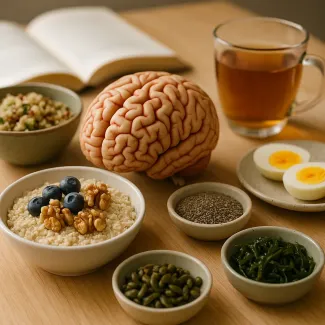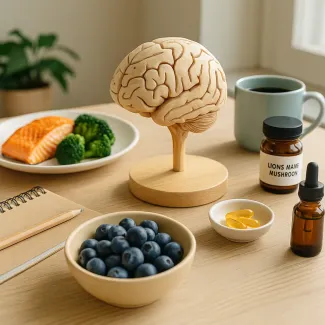
Discover Mental Clarity Through Natural Daily Habits
How to reclaim your focus and overcome brain fog with lifestyle shifts that work
When you feel like you're living in a mental haze—forgetting where you placed your keys, struggling to complete sentences, or losing your train of thought mid-task—it’s not just stress. You might be experiencing brain fog, a state of cognitive dullness that can disrupt your productivity, creativity, and even your relationships. And if you're over 30, these symptoms may feel more persistent. But here's the good news: you don't need high-tech tools or complicated routines to clear your head. Often, natural habits rooted in daily rhythms, nutrition, and environmental awareness can restore your clarity and energy.
Understanding brain fog: why does your mind feel slow?
Brain fog isn’t a medical diagnosis, but it’s a real experience. It manifests as slowed thinking, mental fatigue, inability to concentrate, and memory lapses. For some, it’s a passing sensation after a bad night’s sleep. For others, it lingers for weeks or months, especially during hormonal transitions, chronic stress, nutrient deficiencies, or periods of poor lifestyle choices. If you've ever read the same paragraph three times and still don't remember it, you know what it feels like.
The power of natural daily rhythms
Your brain is deeply tied to circadian rhythms—the 24-hour internal clock that governs sleep, digestion, energy levels, and more. When that rhythm is disrupted, your brain pays the price. Exposure to morning sunlight, regular wake and sleep times, and midday movement support the body’s natural clock and help your brain stay sharp.
Even a simple practice like stepping outside within the first hour after waking can dramatically improve alertness. Sunlight activates receptors in the retina that communicate with the brain’s suprachiasmatic nucleus, which controls the circadian rhythm. This reduces melatonin production and signals your body it's time to be awake, helping you feel more clear-headed in the morning.
Breakfast matters more than you think
Skipping breakfast or loading up on sugar-heavy pastries can cause blood sugar fluctuations that directly affect mental clarity. Your brain relies on a steady supply of glucose—but not in spikes. A nourishing breakfast rich in protein, healthy fats, and fiber supports sustained attention and balanced energy.
Consider starting your day with something like eggs, avocado, and whole grains. These foods help avoid the sharp crashes that come after sugary cereals or processed carbs. Add in a cup of green tea for a gentler caffeine boost with L-theanine, an amino acid that promotes calm alertness without the jitters.
Movement and micro-exercise for clarity
You don’t need a full gym session to sharpen your mind. Short, intentional movement breaks throughout the day are powerful tools for reducing brain fog. Even five minutes of brisk walking, gentle stretching, or climbing stairs can increase blood flow to the brain, enhancing oxygen and nutrient delivery.
Regular movement improves dopamine and serotonin regulation, both of which contribute to mental clarity. Instead of fighting through an unproductive afternoon, try a quick set of jumping jacks or a walk around the block. Movement resets your system, relieves stagnation, and renews focus.
Hydration: the overlooked key to mental energy
Mild dehydration can trigger fatigue, confusion, and even mood changes. Yet many people walk around in a constant state of under-hydration without realizing the toll it takes on their cognitive function. Your brain is about 75% water, and even a 1-2% drop in hydration levels can impair focus and reaction times.
Start your day with a full glass of water, and keep a bottle nearby throughout the day. If plain water bores you, infuse it with lemon, cucumber, or mint for a refreshing upgrade that encourages more frequent sipping.
Nutrients your brain craves daily
Your brain is one of the hungriest organs in your body. It requires a steady intake of micronutrients, amino acids, and healthy fats to function optimally. When these are lacking, the brain shifts into low-power mode.
Prioritize foods rich in:
- Omega-3 fatty acids (from fatty fish, flaxseeds, or walnuts)
- Vitamin B12 and folate (from leafy greens, liver, and eggs)
- Magnesium (from pumpkin seeds, almonds, dark chocolate)
- Choline (from egg yolks, soybeans, beef liver)
- Iron (from lentils, spinach, red meat)
These nutrients help with neurotransmitter production, myelin sheath repair, and oxygen transport—all essential for clear thinking.
Managing cortisol through calming rituals
Chronic stress elevates cortisol, which in high levels can shrink the hippocampus—the brain area responsible for memory and learning. That’s why under stress, you might forget appointments or find it hard to concentrate.
Daily calming rituals reduce the cognitive load of stress. These include:
- Breathwork, especially diaphragmatic breathing
- Evening walks without your phone
- Journaling, focusing on gratitude or processing emotions
- Stretching or yoga, especially before bed
When practiced consistently, these rituals tell your body and brain that it's safe. As cortisol lowers, mental clarity increases.
Sleep as the ultimate reset for mental fog
No supplement or biohack can compensate for poor sleep. During deep sleep, your brain undergoes a process called glymphatic clearance, where toxins and metabolic waste are flushed out. Without this process, cognitive performance suffers.
Build a sleep-supportive environment by:
- Limiting screens an hour before bed
- Using warm lighting in the evening
- Keeping the bedroom cool and dark
- Going to bed and waking up at the same time every day
Even weekends should follow a similar pattern to preserve your internal rhythm. Rested brains are sharper, faster, and more creative.
Natural stimulants that sharpen focus
If you need a cognitive lift, you don’t always have to reach for energy drinks or high-caffeine options. Nature provides several gentle yet effective plant-based focus enhancers:
- Rhodiola rosea, an adaptogen that improves mental stamina
- Panax ginseng, used for mental performance and clarity
- Lion’s mane mushroom, linked to neurogenesis and memory
- Peppermint, known to stimulate alertness through scent
- Rosemary, shown to improve memory when inhaled or consumed
Integrate these into teas, tinctures, or capsules—preferably in the morning or early afternoon, when your brain is most receptive.
Declutter your physical space for mental order
A chaotic environment often mirrors a cluttered mind. You may not realize how much visual noise affects your focus. Piles of papers, tangled cords, or overflowing drawers can increase cognitive load, subtly draining your mental energy.
Make space for clarity by:
- Removing items from your desk that you don’t use daily
- Creating designated spots for essentials
- Adding a plant or candle to introduce calm visual anchors
A minimalist, calming workspace enhances mental spaciousness.
Limit multitasking and reclaim single-tasking power
Multitasking may seem efficient, but studies show it reduces performance and increases mental fatigue. Switching between tasks uses up cognitive resources, making the brain work harder for poorer results.
Instead, practice time blocking—setting aside focused periods for specific tasks, with breaks in between. Use techniques like the Pomodoro method (25 minutes of work, 5 minutes of rest) to retrain your brain toward deep focus.
Reconnect with the present moment through sensory grounding
When your mind feels foggy, it often means you're caught in loops of overthinking, anxiety, or fatigue. Sensory grounding pulls you back into the here and now, allowing your brain to reset.
Try this technique:
- 5 things you can see
- 4 things you can touch
- 3 things you can hear
- 2 things you can smell
- 1 thing you can taste
This simple tool works especially well when you're overwhelmed or disoriented.
Use music and sound to boost concentration
Certain types of ambient music, white noise, or nature sounds can reduce distractions and enhance focus. Binaural beats, in particular, have been associated with improved attention and memory when listened to with headphones.
Choose soundscapes that are instrumental and repetitive—without lyrics—to prevent language interference with your thoughts.
Digital hygiene: your brain on screens
Screen overexposure—especially social media, notifications, and doomscrolling—can fragment attention and drain dopamine. Your brain needs downtime, not just sleep.
Implement digital hygiene by:
- Turning off non-essential notifications
- Keeping your phone outside the bedroom
- Taking screen-free blocks throughout your day
- Using grayscale mode to reduce phone overstimulation
This fosters a healthier relationship with technology and preserves your mental clarity.
Emotional processing as mental clearing
Unprocessed emotions create mental clutter. When we suppress sadness, anxiety, or anger, we unconsciously use cognitive energy to keep them buried. Over time, this leads to mental exhaustion and a sense of fog.
Allow yourself time to feel and express what’s under the surface. Talk to someone you trust. Write without judgment. Let tears flow. Emotional expression is not weakness—it’s cognitive hygiene.
Smell, taste, and touch: awakening your senses to sharpen focus
Engaging the senses can reignite neural circuits and bring attention back into the present. Try:
- Inhaling essential oils like basil or orange
- Eating crunchy raw vegetables or citrus
- Using textured objects like clay or wool to wake up tactile pathways
These sensory experiences stimulate parts of the brain linked to alertness and memory, helping clear the fog.
Connecting with nature to reset cognitive overload
Spending time in natural environments has a profound effect on brain health. Forests, parks, and bodies of water reduce cortisol and increase alpha wave activity, associated with relaxed focus.
Aim for at least 20 minutes a day in natural light and green space—even a short walk in a city park counts. This isn’t indulgence. It’s mental maintenance.
Small daily upgrades lead to big cognitive shifts
Brain fog doesn’t disappear with a single supplement or hack. It fades gradually through a combination of supportive habits, nourishment, movement, and emotional awareness. The goal isn’t just to eliminate fog, but to build a lifestyle that keeps your brain energized, resilient, and clear—day after day.





